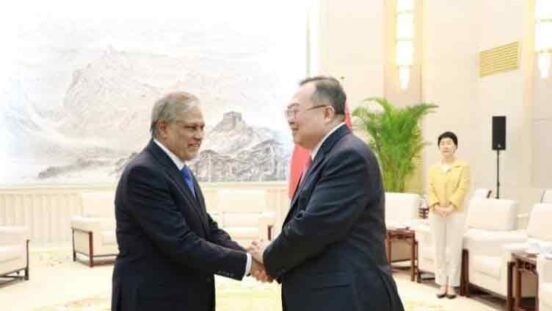By Ahsan Ansari
In the shifting geopolitical landscape of South Asia, Pakistan has taken a significant diplomatic step. Deputy Prime Minister and Foreign Minister Mohammad Ishaq Dar departed for a three-day official visit to Beijing, China, this week. The visit comes at a critical time when tensions between Pakistan and India have intensified following the Pahalgam incident in Indian-occupied Kashmir. The significance of this visit extends beyond Pakistan, as it may pave new paths for regional peace, economic development, and strategic alliances.
India has once again leveled baseless accusations against Pakistan, alleging involvement in the recent attack in the Pahalgam area. Ishaq Dar not only strongly rejected these claims but also stated that Pakistan has presented concrete and irrefutable evidence that exposes the falsehood of India’s narrative. Pakistan has made it clear to the global community that these accusations are nothing more than political blame games. The world is no longer willing to accept India’s narrative without scrutiny.
As a result of Pakistan’s effective diplomatic strategy, major world powers are now reconsidering their perspectives on the Kashmir issue and Indian aggression in the region. Dar’s position reflects Pakistan’s confidence in presenting itself as a peaceful nation, fully detached from all forms of terrorism.
This visit, undertaken on the invitation of Chinese Foreign Minister Wang Yi, symbolizes the growing mutual trust, economic cooperation, and strategic partnership between the two countries. In Beijing, discussions will not only assess the current tension but also explore possibilities for peace, stability, and development in South Asia.
China and Pakistan’s relationship goes beyond traditional diplomacy. Mega projects like the China-Pakistan Economic Corridor (CPEC) further strengthen this relationship from an economic standpoint. As a central component of China’s Belt and Road Initiative, CPEC offers Pakistan economic stability, job creation, and infrastructure development. During this visit, the ongoing CPEC projects will be reviewed, and future directions will be discussed.
The visit is also being viewed through the lens of strategic balance in the region. China’s unwavering support for Pakistan during recent tensions is a testament to Islamabad’s importance as a key strategic ally. This support is not merely symbolic but part of a broader strategic policy.
Pakistan’s active diplomacy and balanced relationships with major global powers have granted it an influential role on the international stage. At a time when India is facing global criticism over severe human rights violations in Kashmir and discriminatory policies against minorities, Pakistan’s peaceful and cooperative stance presents it in a positive light.
Former diplomats Khalid Masood and Maria Sultan have pointed out that Pakistan’s strong ties with countries like China, Türkiye, Azerbaijan, and Bangladesh contrast sharply with India’s growing diplomatic failures. India’s aggressive posturing and internal human rights abuses are pushing it toward global isolation, while Pakistan’s balanced policies are positioning it as a responsible and credible nation.
Pakistan’s continuous diplomatic missions on international platforms, its humanitarian narrative, and consistent calls for peaceful resolution of conflicts all contribute to portraying it as a responsible state. These are the factors that lend Pakistan’s foreign policy a foundation of confidence, dignity, and balance.
Ishaq Dar’s visit is not merely a reaction to the current crisis but part of a broader and long-term diplomatic strategy. This strategy is centered on economic prosperity, security cooperation, and regional equilibrium. Pakistan does not want its relationship with China to be confined to bilateral cooperation but aims to integrate it into a wider global strategic framework.
As instability looms over South Asia, this visit will not only strengthen Pakistan’s partnership with China but will also highlight its constructive role in promoting regional peace, economic growth, and international cooperation. Islamabad’s efforts reflect the reality that in a world marked by global unrest, the nations that forge strategic alliances today will play a decisive role in shaping the decisions of tomorrow.




